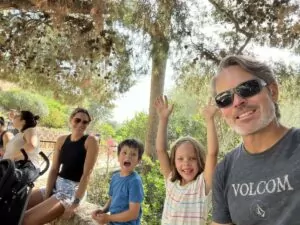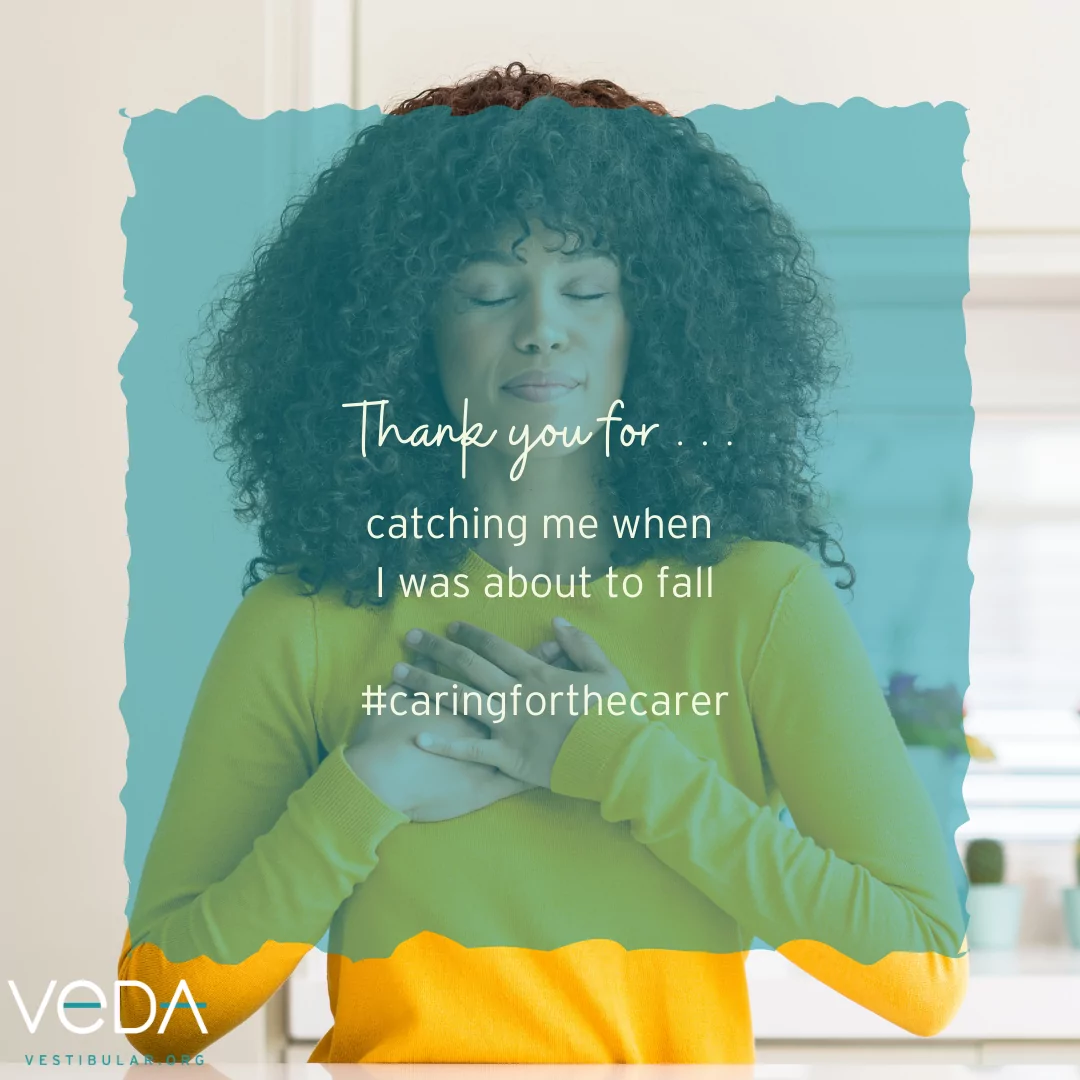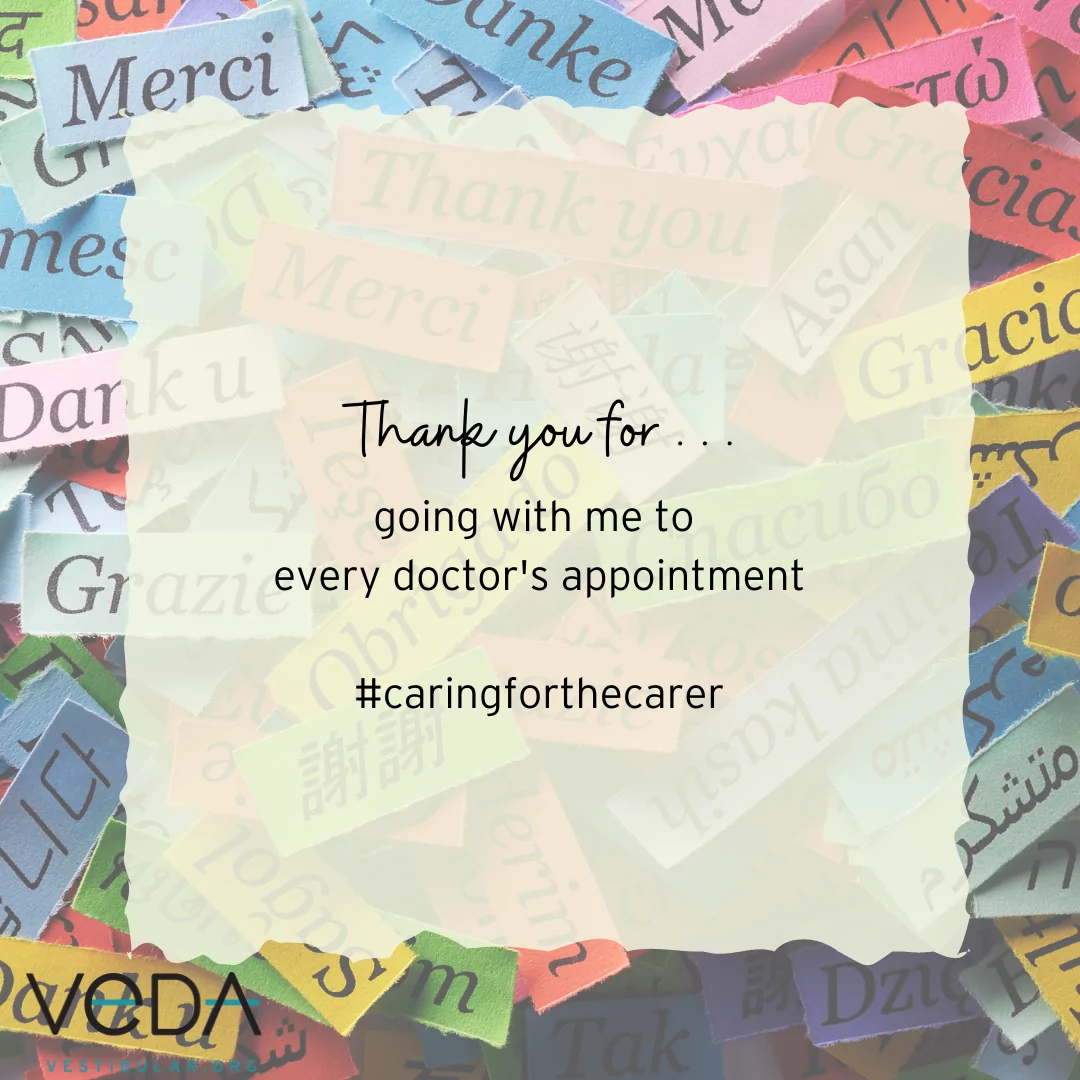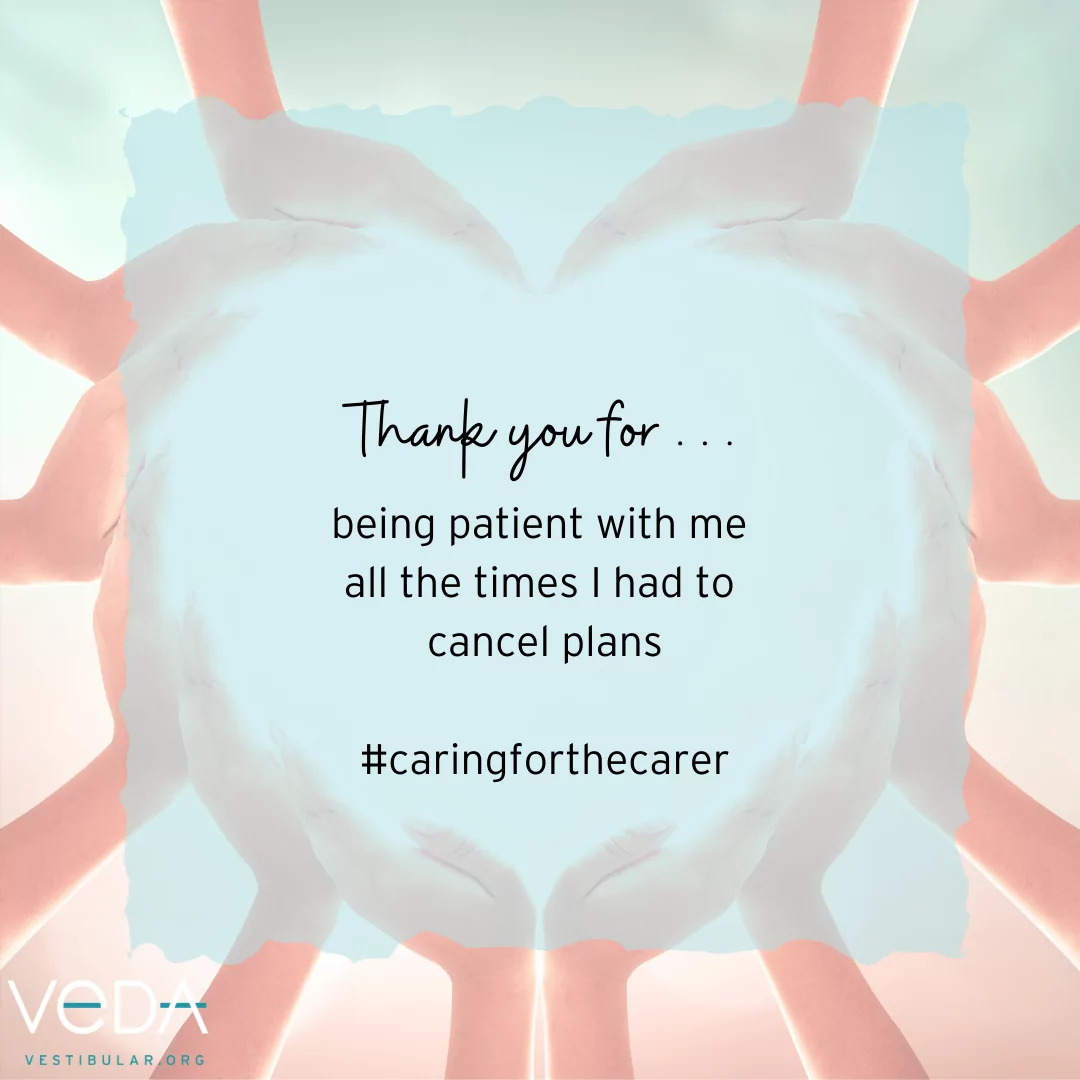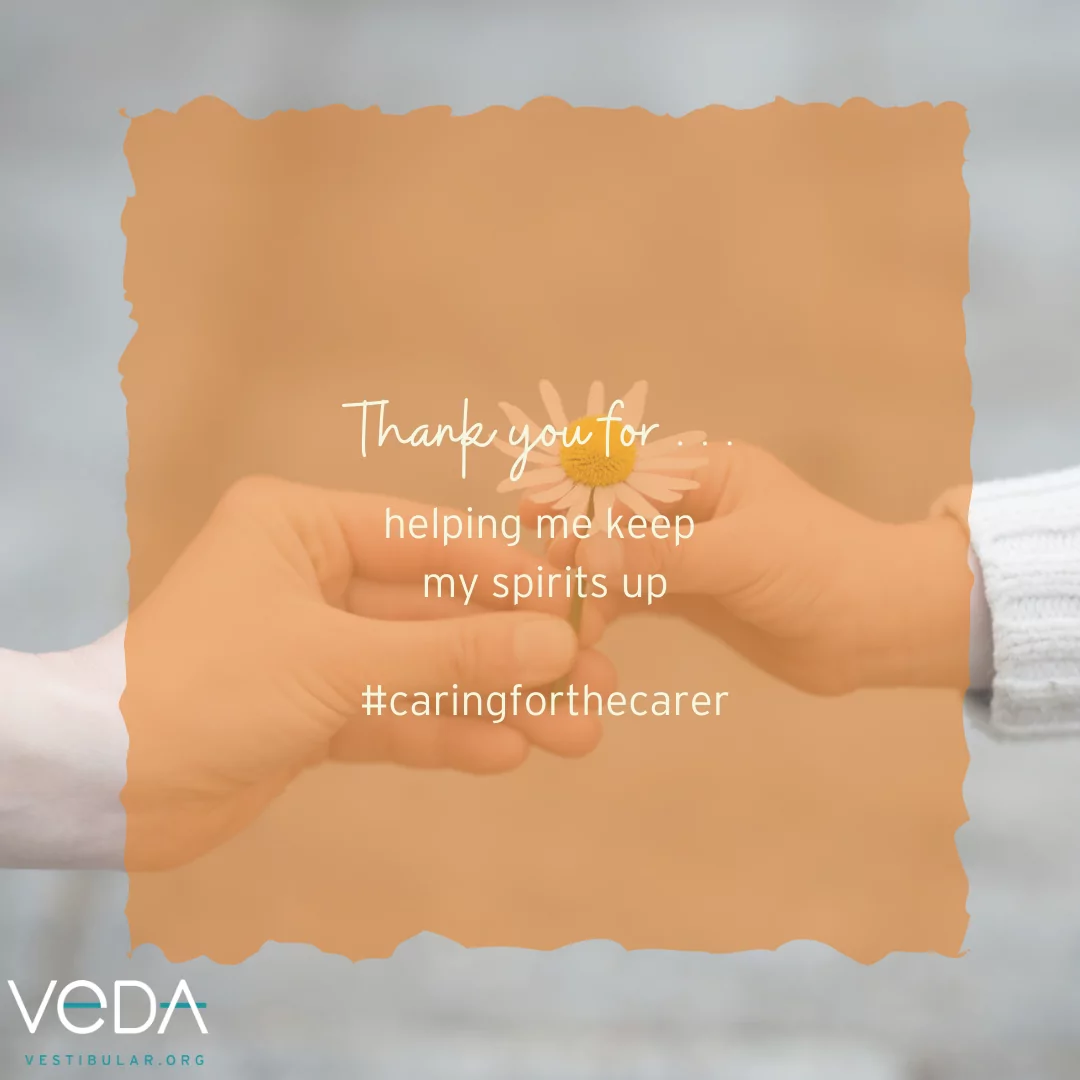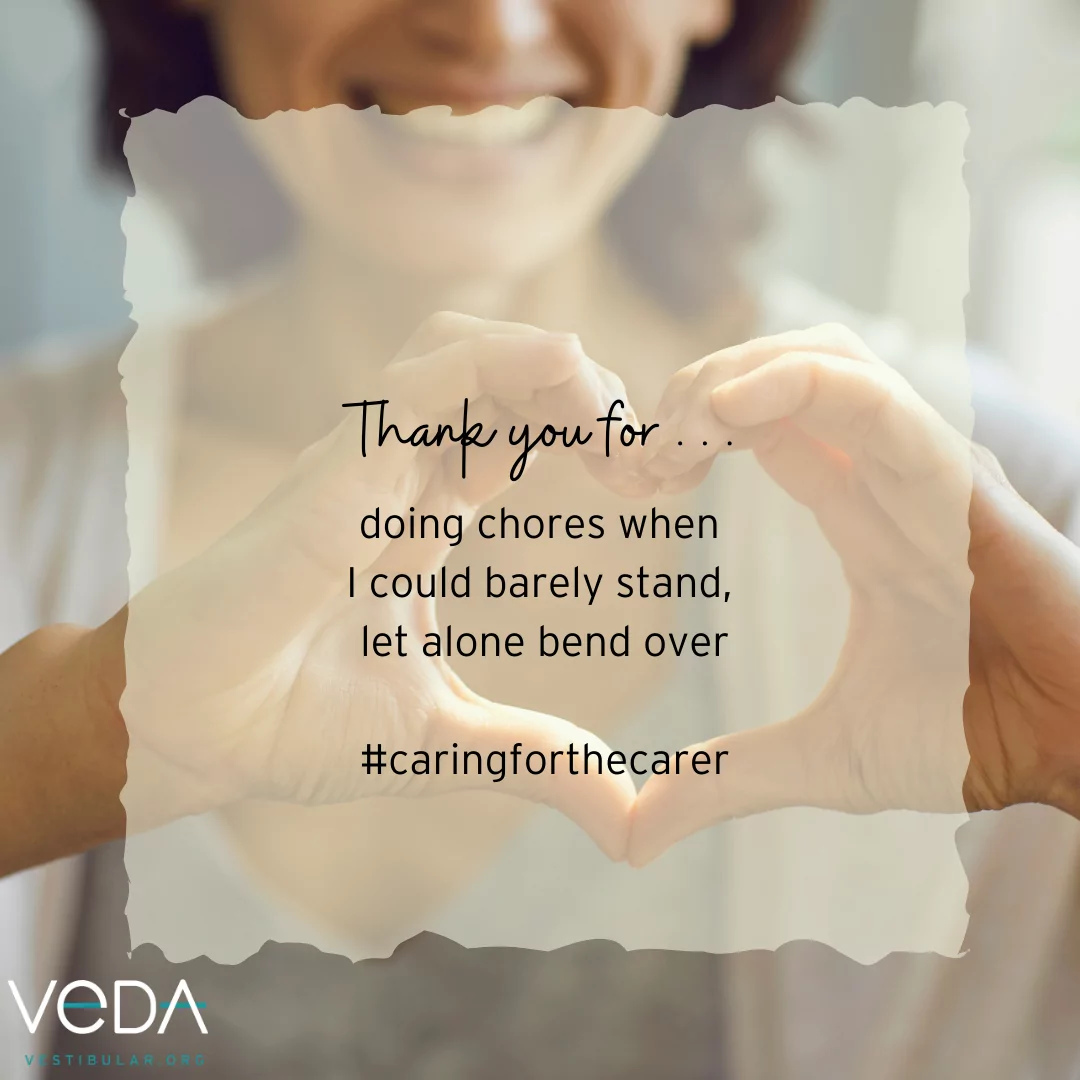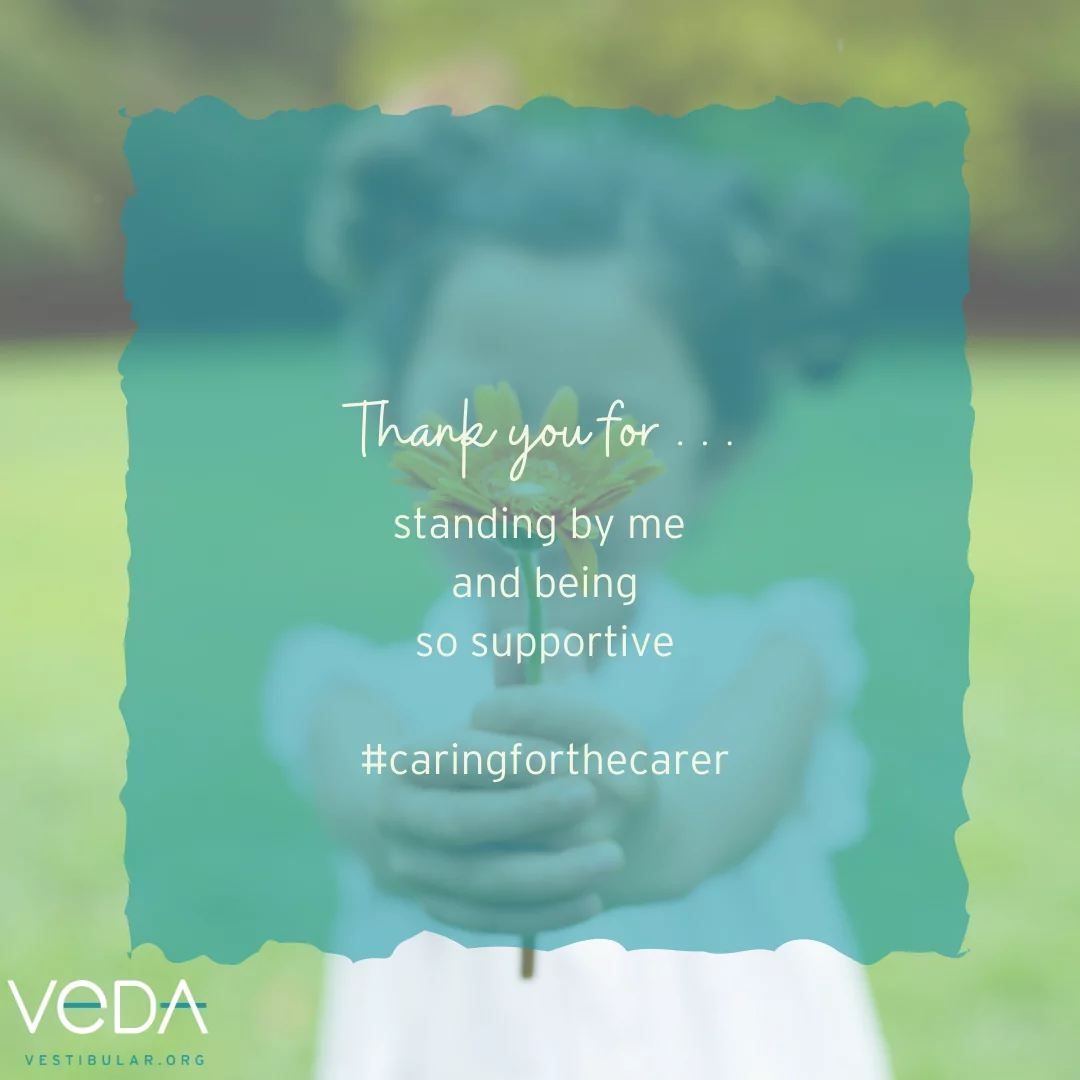“When I was diagnosed with labyrinthitis, my husband was also diagnosed with diabetes. During the acute early stages of my illness, I couldn’t even leave the house. My husband was learning how to manage his illness, and had to take care of me and our daughter. He was and is my hero. 🦩 Even now that I’m back in the world, he understands when I’m dizzy and takes extra care! I am lucky!” -Erin P.
“My physical therapist is a balance and vestibular specialist. I began seeing her a year ago for my bilateral vestibular disorder. Her enthusiasm and continual exploration to discover new methods to challenge me during a therapy session has led to a vast improvement in my day-to-day function, movement, and well-being. She creates a fun and positive atmosphere at therapy that is both motivating and encouraging.” -Karen M.
“My hero 🦩 helped us in establishing our country’s first complete vestibular and balance assessment and management lab, which is now providing diagnosis and rehabilitation services to our patients.” -Abdul M.
“My youngest daughter is my hero. 🦩 She transferred from the college she was attending and moved back home to be my caregiver once I got sick. She takes all her classes online so they don’t interfere with my doctor appointments. She drives me everywhere, since I can’t drive anymore, and does everything for and with me. At 21 years old, she has become my right-hand woman, and I don’t know what I would do without her!! -Jill S.
“My doctor works tirelessly for her patients and eclipses all prior healthcare professionals I have met in my lifetime. She exemplifies trust and professionalism. She has a compassionate, curious mind that gets to the root of your issue. She taught me to not fear my vestibular disturbance, but instead to break down the symptoms into more manageable sets and work them out piece by piece. She takes the guesswork out of very confusing body dysfunction and helped me regain as much of my life as possible.” -Cynthia T.
“I nominate my social worker for exemplary dedication to her clients. Her unwavering ability to navigate the transition of an entire social work department from inside a physician’s office is uncanny. She investigates and explores all options before giving up. She’s resourceful and listens deeply to the underlying issues. She’s been an advocate for vestibular disturbance patients across the globe. She knows my diet means everything.” -Cynthia T.
“My husband is my hero! 🦩 He holds me up when I’m too dizzy to stand. He takes me places when I don’t feel up to driving. He’s been there to take me to umpteen PT appointments when I was too dizzy, and he is by my side whenever I need him. He walks with me, and makes sure I’m coming, even when I’m lagging behind, and makes sure I don’t fall. He says that that’s what marriage is all about!! I love him very much for all of this, but even more for the man he has become and who he is today! 💕❤️💕 I don’t know what I’d do without him!!! I love him more than the day we married.” -Susan B.
“I nominate my mom because she ‘grew up’ with me having a vestibular disorder. She took me to doctor appointments and did her own research. She fiercely defended me when I couldn’t do it for myself.” -Anna C.
“My mom is my hero! 🦩 She takes me to all my appointments no matter how far away or how long they take. She helps me take care of my kids and drives us anywhere we need to go, and she’s my cheerleader — always encouraging, positive and hopeful. 💕” -Julie L.
“My doctor has been instrumental in developing microprism in treating binocular vison dysfunction as a cause of chronic dizziness. I was the first person treated for vertical heterophoria over 30 years ago with resolution of dizziness and imbalance. Since then over 10,000 patients have been treated locally.” -Arthur R.
“My mom has been my hero. 🦩 She is really supportive and patient with my PPPD. She takes me to all my doctor’s appointments, drives me to the local park to help walk my dog. But most of all, she encourages me to sit down when I need to and lie down. She has been a part of my care team through misdiagnosis and improvements with my balance.” -Tanya W.
“My hero 🦩 is one of the few medical professionals who ‘gets it,’ who asks questions carefully, cleverly, to dig out what symptoms we have. He spent much of his off-duty time researching all he could about vestibular disorders. He is someone who understands what I’m going through! As a PCP, he concerns himself with his patients’ physical, mental, emotional, and spiritual health at all times, and remains professionalism with each of these health needs.” -Chet C.
“My hero 🦩 has been there from the first diagnosis and always makes sure to help me navigate any and all situations without judgment and with great concern, gentleness and kindness. He never gives up one me even when I am ready to. I am grateful and lucky to have him in my life!” -Kelley P.
“My hero 🦩 has gone beyond anything in trying to help me with my vestibular issues. He’s taken me to my vestibular rehabilitation therapy appointments, he’s taken me to the store, he’s taken me to other doctor appointments because I can’t drive, and he has driven my daughter and I places where we need to go. He’s got me out of the house and helped me to get through some of my bad times.” -Nicole M.
“My mom has been the steady rock I can lean on since becoming sick two and half years ago. Before I stopped driving she would drop whatever she was doing to come pick me up when I had a bad spell. Now that I don’t drive, she carts me wherever I need to go. She nurses me when I can’t do for myself, she helps me take care of my daughter and so much more. I don’t know what I would do without her.” -Elizabeth L.
“I am nominating my hero 🦩 because of her amazing willingness to support me through my chronic illness. The minute I was diagnosed she researched what she could do to help and still discusses suggestions every time we talk. She is my twin sister and has been with me through everything. I have been dealing with having a chronic illness at 19, going to school, work, and leading a club, and she has been with me every step of the way making sure I have the support I need. Last year there was a time I was feeling extremely low and trapped by my illness, so I called her very late one night, not expecting her to answer. Not only did she answer, she stayed on the phone with me until we had a plan for feeling better mentally. She then confessed to me that she always kept her phone ringer up all the way at night just in case I might call needing her. I don’t know how I would be able to deal with my chronic illness without her.” -Emma L.
“My sister is my hero. 🦩 She is my cheerleader: always positive, giving me encouragement to try things … She was diagnosed with breast cancer last October but is doing great now. Thankfully her attitude gets her and her little sister through the days that are harder than others. I am so proud to be her sis. I am thankful for her giving me countless rides to where we need to go, shopping for me during tough days, hanging on to me when it’s windy, and exercising to keep positive!” -Joni S.
“My husband is my hero. 🦩 I suffered my first drop attack from Meniere’s disease in October 2017. This drop attack led to a fall which caused me to suffer a concussion. My brain MRI also revealed an acoustic neuroma. The concussion affected my vision and vestibular system dramatically. My husband used leave from work to take me to all of my medical appointments, physical therapy and visual rehabilitation therapy. Additionally, he took over grocery shopping, meal preparation and housework while continuing to work full time. On weekends, he often split his time between taking me out for drives (as tolerated) and helping to cover my responsibility of elder care for my 89-year-old father. He helped me at home with my balance exercises and purchased me the exact balance pad used in physical therapy for continuity. He never complained when I would want to get second opinions — he would just grab the keys and say, ‘Let’s go!’ He changed the lighting in the house, adjusts the glare on televisions for my tolerance and comfort. When we are out and I become symptomatic, he immediately reacts to get me to a comfortable and safe space. I have improved tremendously because of his support, understanding and love. He will always be my hero!” -Kim H.
“My hero 🦩 has seen me through my vestibular journey from the moment I had my accident in 2004. She took me in and looked after me when none of my family members could. She would attend all my appointments, both medical and legal. Words of hope and encouragement came from her at every stage and together we fought through every battle. She believed for the two of us that I will get out of bed again, which gave me the strength and courage never to give up hope. She extended her care and love to my children. She has become a true sister. We still carry on, but now we mostly laugh about the things I can’t do any longer instead of being upset.” -Etrily L.
“I’m nominating my husband and my sons! They have always been very supportive anytime I’m down, including dropping everything last month to come and get me and my car from work when I had a vertigo attack. They are my heroes!!! 🦩 🦩 🦩 ” -Debbie S.
“My surgeon is my hero. 🦩 I am the fourth recipient in the world to receive the multi-channel vestibular implant. His desire to learn and courage to explore the unknown in medicine, in particular vestibular medicine, has enabled others and myself to have hope for the future. The kindness in his heart is so very evident, bigger than the sun, and his brilliance shines just as bright. His compassion for others, as well as his passion for his work, is so very evident. He is gifted with the ability to teach in a way that makes my understanding so much better of the vestibular system and the damage I had sustained. He is my hero going above and beyond to support me and all vestibular patients by not only restoring us physically but restoring our hope.” -Betty C.
“My clinical psychologist is my hero. 🦩 I started seeing her this year. The support, comfort, connection and help she has shown me has been a blessing in this horrible battle with this unforgiving disease. I have had chronic vestibular migraine for nearly seven years. I am mostly housebound, except for medical appointments. Being a hermit with hardly any social life tends to take a toll on mental health, plus the lack of independence, confidence, losing who you thought you were — these all have a significant contribution to poor mental health. I don’t think it is spoken of enough. So many people on vestibular chat sites are either suicidal, have feelings that they cannot go on, or are a burden to everyone around them. I have had all of these feelings. Having a wonderful clinical psychologist has opened doors for me I never thought to open. She gives me hope, which is everything to a chronically ill person.” -Kylie D.
“My husband and I were just dating when all of a sudden I became debilitated with vertigo, disequilibrium, nausea and fatigue. I could no longer work and all my dreams seem to slip away from my future. He stayed by my side, supported me financially, and as my partner. One and a half years later, I finally had the diagnosis: bilateral SSCDS. I had a MFC repair, plug and resurface on one side, and it took me months to learn how to walk unassisted. He stayed with me and cared for me, taking me to all of my medical appointments and working at the same time. A year later he proposed to me. We’ve been married for six years and have a beautiful four-year-old daughter. Every day he is there for me supporting me when I’m dizzy and when I’m exhausted, never making me feel badly or inadequate even when that’s how I feel most days. I’m so honored to be his wife and proud to nominate him as my hero. 🦩 I couldn’t have made it through any of my falls figuratively and literally without him. You see there isn’t just one example as he is my hero every day.” -Heather B.
“I nominate my husband because he has unwavering support for me. He has helped me stay positive even when I was not hopeful of recovery. He supports my treatment choices, as I have chosen some alternative options that are very time consuming (like vision therapy). Even though he has not experienced these symptoms, he believes they are real for me. As I have recovered in many ways, I have lingering symptoms that he continues to support. He is my hero. 🦩 ” -Robin H.
“For the last three years, my wife has been by my side as I struggle with Meniere’s disease. The onset of my condition has been as unpredictable and as violent as tropical weather can be. After seeing countless doctors and enduring countless tests, the diagnosis of Meniere’s left me feeling disabled and depressed. My wife has been my most heartfelt champion, my best friend, my advocate, and my nurse — which she already is! Now in medical school myself, she has been there for me through low salt diets, exercise encouragement, being 30 years old and needing a cane, protecting me from loud events, always carrying emergency medications for me, and giving me the safest of spaces to talk about my frustration. I already love her more than anything in the world, but I could never express the gratitude I feel for her caring so deeply for me and my invisible illness. She has not only protected and cared for me as I struggle with this condition, but she advocates and educates her friends, peers, and colleagues in nursing medicine. Her compassion fills me with patience, her strength makes me strong, and her encouragement lets me grow. She makes me a better patient, a better partner, and a more caring physician.” -Constantine K.
“My hero 🦩 has gone above and beyond to help me with my vestibular disorder and balance issues. She has been so patient with me every step of the way even when things weren’t progressing as we would have liked due to other medical issues. She was always creative with her approach to therapy, made it fun and taught me so many different techniques for therapy and vestibular rehabilitation. She’s been so good to me and helped me improve in so many ways with balance, dizziness, migraine, weakness, and spinal issues, just to name a few, and I’m so grateful for her kindness, compassion and dedication to making people better!” -Katie E.
“My hero 🦩 provided progressive central vestibular physiotherapy to me over an extended period, following significant traumatic brain injuries and multiple skull fractures that occurred after I, as a pedestrian, was hit by a truck.” -Vicki H.
“My hero 🦩 has been an outstanding leader in our rehabilitation department at our hospital, sharing her knowledge of the care of patients with vestibular disorders so that we can provide the best care for them when we receive them as patients. She also shares her knowledge with PT students.” -Jennifer R.
“When vertigo hit with gangbusters, my hero 🦩 took off a week from work, dropping everything. When I literally could not stand, he faced me, took my elbows and I fell into his forearms, and we inched together. I was the one to feign wellness and relieve him to return to work. During relapses, he has been there each time, babysitting me. He has been my cheerleader to locate vestibular doctors and treatments, never complaining about distance or costs. He has worked 50-60 hours a week so I didn’t have to. As my vertigo doesn’t allow me to walk without holding walls, door handles, railings, he makes certain I have a cart at a store so I can feel more secure and that we go when there are fewer people, recognizing excess movement and noise interferes with my functioning and stamina. When I’ve relapsed, I call out for help when nausea and/or dizziness starts up. He hustles to pick me up, help me get to the bed or couch or chair. He checks on me in the shower so I won’t fall. He calls 2-4 times a day to be sure I’m okay during the workday. He is my best friend. He listens. It’s hard on him but he has learned to just let me vent or talk something out, and generally, no complaints. He is my best friend. Nobody comes close. I don’t know where I’d be without what he has done for me.” -Patricia D.
“My mom has been my constant cheerleader the past five months with my daily battle with vestibular migraine. My mom has helped me and encouraged me to walk when I had no balance. She has been my eyes when my vision feels like it’s bouncing everywhere, my ears when I miss important information because I can’t focus, and my rock when I feel like I am crumbling down. My mom never judges me. She pushes me only when she knows I need to try, and has reminded me of a greater love that will get me through this. I love my mom and I am so appreciative of all she has done to help me and my family. Mom, you are my hero! 🦩 ” -Marissa A.
“My daughter has been my hero 🦩 from my first attack 10 years ago. She was only 10 years old. She cooks for me, brings me food, cold packs and anything she could think of to help me feel better. She turned 19 this year, she become a carer without complaint. She would drive me with her learner’s permit to the doctor or the hospital when things got really bad. She has taken care of me with so much compassion, always trying to understand what her mum goes through. She would cancel her plans if she knows I’m not well. There are too many circumstances to mention and to give them justice they deserve. She would not want to be nominated as she does not see herself as a hero. She normally says to me, ‘It’s what anyone would do.” She is constantly telling me what a strong and resilient woman I am. I love you, my baby, and thank you so much for being my angel, my lifesaver and my inspiration! 💕” -Sandra L-S.
“My hero 🦩 is not only my soulmate, best friend, wife and mother to our three children, but also my carer as I suffer from Ménière’s disease. She is selfless in making sure I am okay, taking my medication, assisting me in daily routines, making medical appointments and being my rock all whilst running the home and looking after our three daughters. I cannot tell you the level of love and appreciation I have for her, especially as a lot of what she does goes unrecognized by us as a family and others. She is a real saint.” -Paul F.
“My hero 🦩 has an honest desire to help people with vestibular problems and in addition to individual therapy she has created an online program that combines all of the various pieces of the complete puzzle needed to have the most effective recovery program possible. Her own experience with vestibular problems makes her particularly effective in helping others. I have struggled with vestibular problems for years and her assistance and program made a huge difference in helping me. By combining her knowledge and drive with modern media she helps many countless people around the world who suffer from vestibular disorders.” -Myron B.
“My husband is my caregiver. He helps me every day. One day recently, we decided to go for a walk in the woods with our children. My husband reminded me to wear my hat and to bring my walking poles. Despite it being challenging for me, it was beautiful and I was happy to be in nature. At one point, I started to feel my symptoms flare up. My husband took my arm and helped me sit down on a log where I could rest. My husband got me my medicine and had me drink water. When we started back for the car, I started having an attack. My husband held onto me the entire way back to the car, guiding me and speaking softly to me. He is so patient and loving.” -Nichole W.
“My son motivated and encouraged me in the dark times after vestibular neuritis. He gave me love and support always, supported me through vestibular rehabilitation, and beyond. He makes me proud every day 💕” -Phillipa F.
“My husband has gone above and beyond to help when Meniere’s gets out of control. When I have dizzy spells, he is an arm/crutch to help me balance. When I was first diagnosed I was struggling with balance and would even struggle to take showers and get in and out by myself. He went and got adhesive tub stickers and a seat for when I can’t stand up on my own. He gets me food and does everything I’m not able to do for myself. He also makes sure that my doctors listen to my symptoms and advocates for me when I can’t use my voice.” -Lauren K.
“Since the day I was hit with vestibular neuritis, my hero 🦩 stayed by my side, got the kids ready for school, made their lunches, took me to the doctor, held my hand and reassured me. Not knowing initially what was wrong, we were both scared with the possible diagnosis of MS, but he took on the extra roles with a smile on his face and helped me the best he knew how. I appreciate all he did and now understand the meaning of ‘in sickness and in health.'” -Stephanie P.
“My mother is my hero. 🦩 When I was diagnosed with vestibular neuritis back in 2016, her and my father dropped their lives to take care of me. I was so sick my husband couldn’t take care of me so I moved in for a few weeks to my parents’ place. My mother is the one who found VeDA’s website and read it top to bottom and front to back. She found out the type of doctors she had to take me to and drove me all over to find the right ones. She brought me to my VRT sessions 2-3 times a week…. When I started getting better, she was diagnosed with breast cancer. She began to fight her own battle, but still cared more for my well-being than her own. Luckily she is a breast cancer survivor. When I got sick again in July 2017, now diagnosed with Meniere’s, BVD and vestibular migraine, she continues to be my full supporter and my advocate as well. She is my voice to family members and friends who question what disorders I have and spreads education to all that will listen. She is my hero. She is the most important person in my life, other than my husband. She herself is a true warrior and a fighter.” -Stacy H.
“My husband is my hero 🦩 for he is always there for me since Day One. When I lost all my balance and was hospitalized for a week, he took six months off from work to take care of me: he bathed me, fed me, dressed me, and took care of me as I learned to take care of myself again. The patience and understanding he has shown for this crazy disease goes above and beyond anyone I know! He has been a savior as I put my life back together and gave me the strength to return to work.” -Rebecca D.
“My husband acknowledges that I am living 24/7 with constant vertigo that hasn’t stopped. He lets me avoid any movement of my head, eyes, or body that will cause my vertigo to intensify. He describes what I can’t see with my double vision. He holds me up when I stumble and hugs me when I lose my balance. He doesn’t feel embarrassed by my how I walk. He repeats himself when I don’t understand what he says. He reminds me when I forget what I’m saying or doing. He drives me to my doctor appointments, therapy sessions, and anywhere we need and want to do. He is patient with me when I know I’m driving him crazy. He encourages me to laugh about my challenges rather than cry about them. He takes me seriously when I tell him what is happening to me. He believes me and doesn’t stop believing in me. He doesn’t tell me it’s all ‘in my head.’ He validates my feelings. He accepts that my brain is hurt. He doesn’t tell me to ‘just drive’ or ‘just work again.’ He knows I have limits in how much I can tolerate. He lets me get my thoughts and words out when my brain doesn’t feel like sharing. He takes over all the roles of a spouse, parent, caretaker, financial supporter. He lets me sleep, rest, do nothing. He listens to how I’ve been affected mentally, physically, emotionally, cognitively, even though it hurts him to know. He doesn’t make me talk when I don’t feel like explaining. He nurtures my positive attitude when most people would have gone insane by now. He defends me. He still finds me attractive. He gives me so many opportunities to laugh out loud! He tries to come up with solutions instead of adding to the problem. He is a true hero for constantly guiding our children through the ups and downs of my injury. He is a hero for the endless lessons he has taught and continues to teach our children about empathy, patience, understanding. He is a true hero for standing by me no matter what. I love my hero. 🦩 ” -Tiffany P.
“My hero 🦩 is my doctor. He worked with me for over a year, helping with dizziness, visual problems, and all things vestibular. His expertise, patience, and unwavering encouragement helped to rebuild my life.” -Diana C.
“My hero 🦩 has been with me every wobbly, spinny step of the way, I wouldn’t get through the bad spells without her.” -Sarah H.
“My husband is my hero, my safe place. I have been fighting with my body since I was 20 years old, always crying and asking why everything is happening to me, but he is always there to help me rise up and keep fighting. He makes me want to leave no matter how hard it would be. I’m grateful to have him as my hero. 🦩 ” -Wilkangelys D.
“For the last five years, my hero 🦩 has been my vestibular therapist, treating me with every newly developed and validated therapy. She is the quintessential practitioner – she continues to research new ideas, is always willing to discuss the best ideas for me personally. Above and beyond her professional capabilities, she is the kindest and most supportive person I have worked with. I have seen over 15 doctors for my disorder and continue to search for the answers that are elusive, but I am always heartened and uplifted when I see her. She makes sure I am on the right track and keeps me optimistic. She has been my hero!” -Janit G.
“The morning this all started my husband has never left my side. He has gone with me to appointments, encouraged me to continue seeking answers when the doctors couldn’t figure it out, gone above and beyond in taking care of me on my bad days, as well as the house and our son. He makes sure that I have all I need and protects me when others have upset me. Without his love and support, I probably would have given up a long time before I got answers. He is an amazing supporter for me emotionally, physically and mentally, a wonderful husband and father and a dedicated soldier and employee.” -Toye T.
“Before I started having vestibular issues, my husband and I weren’t doing so well. He has stepped up in so many ways to help me get through this. He has been a great emotional support and has encouraged me when I’m down, held me while I cried and made me laugh when things didn’t feel so funny. Mostly, I’d like to nominate him for re-arranging his schedule on a daily basis to get me back and forth to work and to appointments. He’s been a rock for our family and my own personal hero. 🦩 This experience has brought us closer and given us something bigger than ourselves to fight together.” -Carm D.
“My hero 🦩 has been helping me since the start of my vestibular issues. She was my personal trainer before my brain surgery that resulted in my hearing loss and hence my vestibular issues. She learned the therapy exercises to assist me, regain and manage my balance, and coached me throughout a very difficult time in my life, always encouraging me. She became a dear, close friend and I am grateful for her genuine interest in my health. She provides full of unconditional love. She is a shining star and most definitely my hero!” -Sandra R.
“Mi marido es mi héroe 🦩 , nunca me deja sola y siempre toma mi mano. Lo amo hasta el infinito y más allá!” -Andrea R.
“My hero 🦩 has worked tirelessly. He has much expertise, care and compassion regarding all types of balance conditions.” -Penny M.
“When I fell really ill with my vestibular disorder, my dad supported me in every way possible. He took me to my hospital appointments even if it meant he had to take time off work, took care of me when I was really sick, provided for me financially when I could no longer work and even paid a lot of money towards private treatment for me. I really don’t think I would have been able to get through it if it wasn’t for the support my dad gave me.” -Katie S.
“My husband has helped me walk around the house, did all the housework, gone with me to all my doctors, did all the bills, and worked 40 hours a week. He’s my rock!” -Febe M.
“Last December I became ill, and was diagnosed with Bell’s palsy and vestibular neuritis at the same time. Throughout the early time when I was diagnosed it was really hard for me and my wife. With two kids and only one income, my wife was my rock. I couldn’t drive, cook, give the kids baths, shovel the snow outside, or even work. My wife would drive me to appointments, go to work, come back home and cook dinner, give the kids their baths, prepare lunches for the next day. Almost a year later and I am getting better, but I can’t work long hours due to the dizziness. I am able to help my wife a lot more, but she had a tough year. She is a strong woman that has a huge heart. She is always helping others, and is such a generous person.” -Jonathan M.
“My kids are my heroes. 🦩 🦩 For the last three years they have driven me everywhere. They share the burden of getting me to and from work or anywhere else I need to go. I could not function without their help.” -Lisa F.
“My son was 16 when a vertigo attack brought on intense vestibular migraine symptoms a year and a half ago. He has been by my side encouraging and supporting me every day since. He’s picked up extra household chores, errands while managing his own homework and activities, helped me with so much that I could no longer do independently, supported me as I worked to retrain my brain to walk, take car rides, etc., and most of all through all of the rough days, he’s been able to make me laugh, always there with a hug and an ‘I love you’ and reminding me how far I’ve come. He’s my hero 🦩 and I am so grateful for him every day.” -Marybeth B.
“My husband is truly my hero. 🦩 We had only been married for four years when I developed Meniere’s disease. The goals we had set for our lives have had to be modified countless times since then. For 31 years since my diagnosis, he has helped me to believe in myself despite my physical limitations. He has been my champion, loving me, whether I was stuck on the couch for hours waiting for an attack to pass or sitting with me on the floor, gently stroking my hair until I was able to get up after a fall. He has helped me to feel that my life still has meaning and that I can make a difference even with the limiting effects of my disease. A hero doesn’t need to be someone who finds an amazing cure or creates a musical masterpiece. There are some truly gifted quiet heroes who improve the lives of others with their unwavering support, unconditional love, genuine encouragement and selflessness. I am blessed to live my life with that kind of hero who has stood beside me. I wish everyone who suffers from a vestibular disorder could have their own personal hero to light the way through the darkest of times. I feel truly blessed to have my very own hero, my love of a lifetime, my beacon, my anchor, my soulmate and extraordinary husband. I will be forever grateful.” -MaryAnn K.
“After nine months of unsuccessful and frustrating visits to numerous doctors for constant dizziness and rocking sensations, my doctor was the only person able to properly test, diagnose, and successfully treat me. A warm, caring, empathic professional and human being, he always took time to listen, answer questions, and provide comfort, support, reassurance, and education. Thanks to him, I got my life back and am forever grateful to him!” -Jody C-G.
“My physical therapist helped greatly identifying my main problems. She is very well informed of vestibular dysfunctions, and very willing to learn more. She is supportive and anxious to help me conquer my symptoms.” -Gary B.

